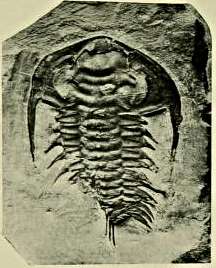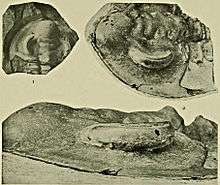Holmia (genus)
Holmia is a genus of a well known group of extinct arthropods, the trilobites, that lived during the Lower Cambrian (Atdabanian) in what are now Scandinavia, Poland and Morocco.
| Holmia | |
|---|---|
 | |
| Holmia kjerulfi, as depicted by Kiaer, 1916 | |
| Scientific classification | |
| Kingdom: | |
| Phylum: | |
| Class: | |
| Order: | |
| Suborder: | |
| Superfamily: | |
| Family: | |
| Genus: | Holmia Matthew, 1890[1] |
| Species | |
| |
Etymology
Holmia is the Latin name for Stockholm, in the neighborhood of which early finds of this trilobite were collected. H. kjerulfi was named in honor of the Norwegian geologist and paleontologist Theodor Kjerulf.
Taxonomy
Species previously assigned to Holmia
- H. hyperborea = Mesolenellus hyperborea
- H. ljungneri = Fallotaspis ljungneri
- H. lundgreni = Elliptocephala lundgreni
- H. macer = Mummaspis macer
- H. mickwitzi = Schmidtiellus mickwitzi
- H. mirabilis = Elliptocephala mirabilis
- H. rowei = Esmeraldina rowei
Distribution

Cephalon of Holmia kjerulfi, from different angles
- H. kjerulfi occurs in the Lower Cambrian of Norway (near Tomten, Sparagmite Formation, Mjosen, Atdabanian, 60.9° N, 10.7° E),[1] and Poland (Ocieseki Sandstone Formation, Holy Cross Mountains, Atdabanian, 51.0° N, 20.0° E).[3]
- H. grandis occurs in the Lower Cambrian of Norway (near Tomten, Sparagmite Formation, Mjosen, Atdabanian, 60.9° N, 10.7° E).[1]
- H. glabra and H. orienta are found in the Lower Cambrian of Poland (Ocieseki Sandstone Formation, Holy Cross Mountains, Atdabanian).[3]
- H. lapponica was found in the Lower Cambrian of Sweden (Grammajukku Formation, Holmia kjerulfi-zone, on the NE shore of Lake Langvattnet near Langsjoby, 10 km W of the village of Storuman, county of Vasterbotten, southern Swedish Lapland).[2]
- H. palpebra was collected from the Lower Cambrian of Sweden (Upper part of the Grammajukku Formation, in the Holmia kjerulfi-zone, E bank of the Torbacken rivulet, about 600 m South-Southwest of Delliknas, the Laisvall area, central Swedish Lapland).[2]
- Unidentified specimen probably belonging to Holmia are also known from the Lower Cambrian of Morocco (Issafen Formation, Antatlasia gutta-pluviae/Sectigena-zone, Atdabanian),[4] and Sweden (shore 600 m North of Gislövhammar, Gislöv Formation, Atdabanian (55.5° N, 14.3° E).[5]
gollark: Just post and enjoy the salt!
gollark: Free! Offer CB neglected.
gollark: I've now got a cheese, CB copper, dino, two papers, and two CB zyus. I'm fairly sure I still won't be able to get anything nice.
gollark: "FREE!"
gollark: But that's a cesspool of lies.
References
- Kiaer, J. (1916). "The Lower Cambrian Holmia fauna at Tomten in Norway". Videnskapsselskapets Skrifter. I. Matematisk - naturvitenskapelig Klasse (10): 140.
- Lieberman, B.S. (1999). "Systematic Revision of the Olenelloidea (Trilobita, Cambrian)" (PDF). Bulletin of the Peabody Museum of Natural History. 45.
- Orlowski, S (1975). "Jednostki litostratygraficzne kambru i gornego prekambru Gor Swietokrzyskich [Cambrian and Upper Precambrian lithostratigraphic units in the Holy Cross Mountains]". Acta Geologica Polonica. 25 (3): 431–448.
- Geyer, G; Palmer, A. R. (1995). "Neltneriidae and Holmiidae (Trilobita) from Morocco and the problem of Early Cambrian intercontinental correlation". Journal of Paleontology. 69 (3): 459–474.
- Bergström, J.; Ahlberg, P. (1984). "Uppermost lower Cambrian biostratigraphy in Scania, Sweden". Geologiska Föreningen i Stockholm Förhandlingar. 103: 193–214. doi:10.1080/11035898109454518.
This article is issued from Wikipedia. The text is licensed under Creative Commons - Attribution - Sharealike. Additional terms may apply for the media files.